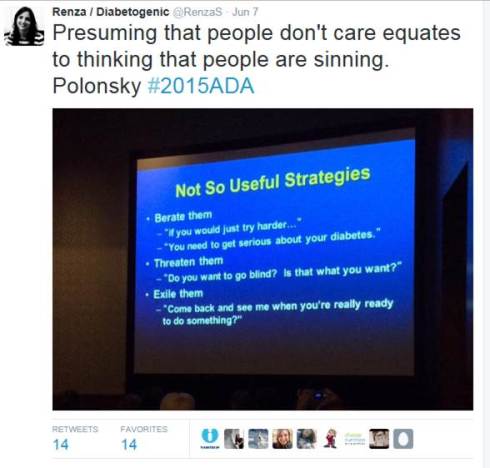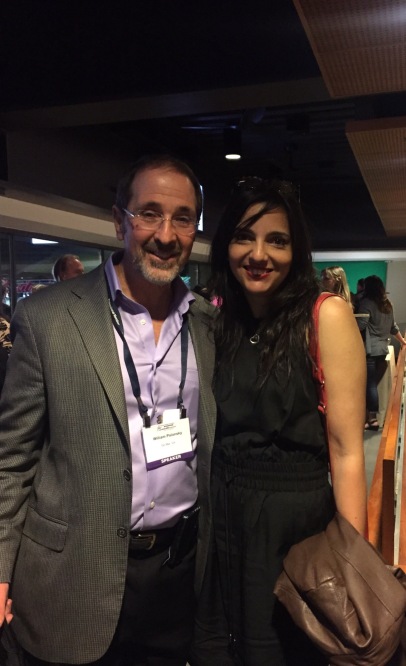One of the highlight sessions I sat in on at ADA was Dr William Polonsky. Bill is the Co-Founder and President of the Behavioural Diabetes Institute, which you can read all about here. He also wrote the book Diabetes Burnout which is on the shelves of many, many people living with diabetes. I refer to it ALL THE TIME, and my copy has become incredibly dog-eared and annotated in recent times. And there was a period of about 6 months where I carried it around with me like a security blanket. (If you don’t have it, you can order it here.)
I’ve seen Bill speak at other conferences I’ve attended – he is one of the speakers I always make a point to hear because he absolutely ‘gets’ diabetes. His talks are always informative, amusing and offer great take-home messages for the mainly-healthcare professional audience. And he is gentle, kind and completely and utterly non-judgemental.
Yes – I am a complete and utter fan girl! But I did manage to keep myself together when I spoke with him a couple of times at the conference. And only slightly squealed when I heard he would be coming to Australia later this year. (Watch this space!)
His session at this year ADA had the title ‘Caring for the patient who doesn’t seem to care’ and right off the bat, Dr Polonsky highlighted the word ‘seem’ in the title.
He started by asking the audience how many of them had, in the past year, seen a patient who didn’t seem to care about their diabetes. Just about every hand in the room went up. Of course they did. Because for many – most? all? – of us living with diabetes, there are times when it all gets too much and we seem to not care.
But then he reminded everyone that even those who seem to not care about their diabetes want to live long, happy, healthy lives.
I don’t know anyone with diabetes – feeling good or not so good about their management – who isn’t hoping to be healthy. No one wakes up in the morning and says they want to have a crappy diabetes day. No one says ‘Diabetes is too much for me at the moment. I hope I have a really bad hypo.’ No one.
In times of burnout, where I absolutely know it looks like I couldn’t give a toss about my health, I wish so hard that I could find ways to break through the exhaustion and lack of motivation and find a way – any way – to do better at managing my diabetes.
Other take home messages from Bill’s talk included the importance of talking about diabetes with a sense of urgency – however without threats. I loved how he suggested a reframing of the oft-quoted ‘diabetes is the leading cause of <insert complication>’, reminding us all of the following:

Dr Polonsky’s take home messages from this talk were many. He provided some strategies for what might work – and some that should be avoided.

I listen to talks like this and think they sound so logical and sensible, and wonder why it even needs to be said. But of course it does. Because sometimes – all too frequently – there is this idea that not managing diabetes as expected is a deliberate choice. Or that not getting the results that we all ‘should’ be getting is the fault of the person living with diabetes. Thank you to Dr Polonsky – and others like him, including Martha Furnell, Jill Weissberg-Benchell and our very own Professor Jane Speight – for understanding that there is no fault here. Just a need for better understanding and support.

Being a total fan girl here! Dr Polonsky is my hero.








16 comments
Comments feed for this article
June 16, 2015 at 2:59 pm
LMC
Well, i am a fan of you both I am really enjoying your posts from attending the conference.
LikeLiked by 1 person
June 17, 2015 at 10:56 am
RenzaS
Thank you!
LikeLike
June 16, 2015 at 3:10 pm
Tony
I’m still new to this diabetes thing so have things to learn but I find those periods where I seem not to care is the time that internally I care the most, I just couldn’t be bothered doing anything about it.
The rest of the time it’s kind of like autopilot doing what works and it’s not a worry.
LikeLiked by 1 person
June 17, 2015 at 10:57 am
RenzaS
That’s a really interesting point, Tony. I think that I do the same. Although I’m not sure that it’s ‘couldn’t be bothered doing anything’ so much as ‘unable to do anything’. Thanks for your comment.
LikeLiked by 1 person
June 17, 2015 at 11:16 am
Tony
Yeah probably not the best choice of words. Didn’t mean “couldn’t be bothered” as in intentional lazy but I can’t think of a better way to say how I feel.
LikeLike
June 16, 2015 at 3:46 pm
Denise
I think when he comes to Australia Renza you and he should take front and centre on stage. I would love to hear what you both have to say and I’m sure I wouldn’t be the only one who’s thinking this.
LikeLike
June 16, 2015 at 3:47 pm
RenzaS
Oh Denise – no one wants to hear from me when Bill Polonsky is on stage (least of all me!).
LikeLike
June 16, 2015 at 5:33 pm
Sue
Hear hear to every word of this post!
LikeLiked by 1 person
June 16, 2015 at 7:13 pm
Jenny Edge
Seems there will be a queue for Dr. P., Renza. Have ordered 2 books coz my daughter will need a copy. (best ask her first, just realised what I’ve said,Would not accept anyone doing that to me so why should my daughter have anything forced on her? )
LikeLiked by 1 person
June 17, 2015 at 10:59 am
RenzaS
Ha! Good work listening to your own advice there, Jenny! Thanks for reading and for your comment. Let me know what you think of the book. I really wouldn’t be without it.
LikeLike
June 17, 2015 at 3:00 am
Karen
Glad I’m not the only Polonsky Fan Girl around!!
LikeLiked by 1 person
June 17, 2015 at 10:59 am
RenzaS
I think we are many, Karen!
LikeLike
June 17, 2015 at 7:24 am
StephenS
Awesome… and he’s coming to your country too! Glad you were there to see him in person.
LikeLiked by 1 person
June 17, 2015 at 11:04 am
RenzaS
Cannot wait to see him here in Australia!
LikeLiked by 1 person
June 17, 2015 at 10:50 am
Scott E
I’ve heard the “Leading cause of nothing” quote before, but never heard the emphasis on the word “seem” before. But as I read it, it made perfect sense — and Tony’s comment above reaffirmed that. Great to see that perspective!
LikeLiked by 1 person
June 17, 2015 at 11:05 am
RenzaS
It was a really great point for Bill to make, Scott. Thanks for reading and for your comment.
LikeLike